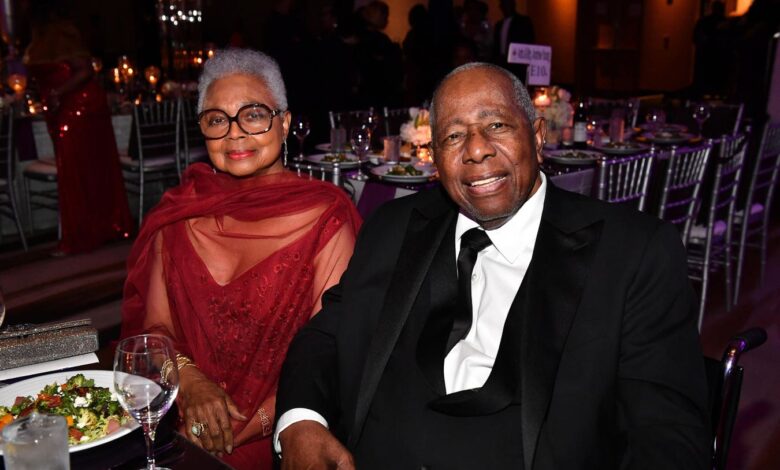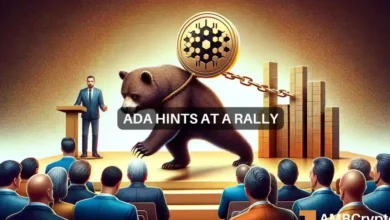Atlanta Icon Hank Aaron Was Heavy Hitter In Civil Rights Too, Wife Says

Hank and Billye Aaron wore formal clothes for the United Negro College Fund dinner in 2019. (Photo … [+] by Paras Griffin/Getty Images)
Thanks to his widow Billye, the memory and legacy of Henry Louis Aaron still occupies a large space in Major League Baseball and beyond.
Three major anniversaries are approaching: the third anniversary of his passing, on Jan. 22; the 90th anniversary of his birth, on Feb. 5; and the 50th anniversary of his 715th home run, breaking Babe Ruth’s hallowed home run record, on Apr. 8.
At 87, Billye has already lived longer than her late husband. But she hasn’t let age stifle her energy.
Shortly before Martin Luther King Day, she flew to Las Vegas to participate in the presentation of the Hank Aaron Awards to the top hitter in each league and then enjoyed a Caribbean vacation.
When she’s home in Atlanta, however, Billye is busy attending baseball events, going to games at Truist Park, and perpetuating the Aaron agenda of advancing civil rights and helping children.
Of the upcoming golden anniversary celebration, she admits to mixed feelings.
“It’s hard to celebrate anything now after Henry has gone,” she said in an exclusive interview, “but I try my best to keep his legacy and understand what it would have meant to him if he were here.”
It is a legacy that was encouraged and nurtured by the late Dr. Martin Luther King, Jr., an Aaron friend who happened to be a great baseball fan.
They met after the Braves moved from Milwaukee to Atlanta in 1966.
Billye Aaron met her future husband seven years later when Aaron was a guest on her Atlanta television talk show. In retrospect, she realizes his legacy went far beyond his achievements in baseball.
“He appreciated that baseball recognized his contributions but it was a matter of the times in which we live,” she said. “Everybody seemed a little scared to jump into the ring because Babe Ruth held the record for so long.
“It just didn’t seem right to a lot of people that someone would come along and break that record. Especially some black kid. That didn’t sit well with a lot of people. “But we came to understand we lived in a society that places less value on African-Americans than it does on other people. It was just something we had to come to grips with.”
Even when he got the loudest and longest standing ovation at the 2019 Hall of Fame Inductions, the last he attended, Aaron never expressed excitement about it.
After hitting his historic 715th home run, Hank Aaron receives a vanity license plate from Jimmy … [+] Carter, then Georgia governor, as wife Billye beams.
“Henry never glorified himself,” said Billye, a benefactor of the Morehouse College of Medicine and promoter of the United Negro College Fund. “He never spent a lot of time trying to get glory or praise for what he’d done but was appreciative when it came.
“He was pretty quiet and withdrawn when it came to praising himself or when he got praise. At other times, he would say, ‘I’m glad it finally happened.’ But he didn’t make a lot of noise about it.”
Both Aarons were raised in the segregated south, Henry in Mobile, AL and Billye in Anderson County, TX.
“I have to say in our situation, growing up where we grew up, knowing how racism plays out, how people looked at us and saw us under a different magnifying glass, somehow if you’re going to keep your eye on the prize, you have to understand the situation under which you live.
“You had to accept to a degree how valuable you were or not valuable you were to the whole. That’s where we took it and that’s how we ended with it.”
Jackie Robinson’s integration of baseball in 1947 opened the door for Aaron, Willie Mays, Ernie Banks, Frank Robinson and a host of other talented black players previously excluded from the major leagues.
“Henry tried to show his appreciation for all Jackie meant not just to African Americans but to Major League Baseball as a whole,” his widow said. “He was very concerned about sharing that legacy and perpetuating that message with young people and especially young black people who’d been denied that opportunity. I think he did a great job of keeping that legacy and trying to pass it on.”
Robinson was in his second season when he came to Mobile to give a talk attended by the 14-year-old Hank Aaron. Years later, as an established professional athlete, Aaron established close ties with Dr. King, Jr., a big baseball fan, and fellow Atlanta-based civil rights leaders Ralph David Abernathy, Andrew Young, and Martin Luther King, Sr. Aaron now shares a row in Atlanta’s South-View Cemetery with King, Sr.
“His biggest achievements came as a human being,” Billye Aaron insisted. “By the time he retired from baseball, his interests had grown.
“He was very interested in people. We had watched a documentary that grew his interest in trying to help little black boys and girls become whatever they wanted to be but many of them did not have the resources.
“He knew and understood what it meant to be poor and particularly to be poor in the south, where you were denied every opportunity. So we started the Hank Aaron Chasing the Dream Foundation to assist young girls and boys to go after their dreams, to pull themselves out of their situations so that they could become full-fledged human beings capable of helping somebody else.”
Since signing to play for the barnstorming Indianapolis Clowns, a Negro Leagues team, Henry went from a scared teenager with $2 in his pocket to the highest-paid player in the game, at $240,000 a season. But his last year in the majors, 1976, dove-tailed with the start of free agency, allowing players to sell themselves to the highest bidder on the open market.
Although he made millions in business through car dealerships and restaurant franchises, Aaron never begrudged the players who followed him and realized riches in baseball he never could.
“He regretted he wasn’t in the money but never resented the other players,” said Billye, whose husband followed his 23-year playing career with an even longer tenure as an Atlanta front-office executive.
“He said the players were getting what they probably deserved even though it was a lot more than he could have dreamed of at the time. He would just say, ‘I think I could have gotten that salary.’”
In his later years, Aaron was often asked what he thought of the player salaries that resulted from free agency. His often chuckled and said, “I’d just go see Ted Turner and say to him, ‘Hello, partner.’”
Turner, the television magnate who founded CNN and launched the TBS SuperStation that created Braves fans in every state, bought the Braves in 1976 and quickly brought Aaron back to Atlanta after he had spent his final two years as designated hitter for the Milwaukee Brewers.
By then, Henry had taught his wife about baseball.
Though she admits she once knew nothing about baseball, Billye Aaron was all smiles after husband … [+] Hank broke the most cherished record in sports.
“It wasn’t that I wasn’t a big baseball fan,” she admitted. “I didn’t know anything about it. I just sat and had Cracker Jack, peanuts, and Coca-Cola
KO
“I learned the game after I met Henry. He would explain to me what was happening.
“He actually didn’t like watching the game with me because I asked too many questions and he wanted to focus on the game. It was how he reacted to baseball, how he appreciated baseball, and what it was doing to get us ahead. I tried to learn as much as I could by osmosis and that’s what I did.”
She said she prefers attending the game rather than watching it on television. She also finds time to keep in touch with past and present friends from the Braves, including future Hall of Fame manager Dusty Baker, with whom she is close.
Baker, who was in the on-deck circle when Aaron broke Babe Ruth’s record, is one of several major participants from that 1974 game likely to participate in pre-game ceremonies at Truist Park on April 8, the Monday night that will mark a half-century since Aaron’s 715th.
Asked whether she was excited about that night and subsequent events now in the planning stages but not yet announced by the Braves, Billye Aaron answered, “I am indeed. I just wish Henry could have been here for the 50th anniversary.”
The “Chasing the Dream” exhibit devoted to Aaron’s life and career in the Baseball Hall of Fame is one of only two permanent exhibits devoted to a single player, with the other belonging to Babe Ruth. Hank Aaron was enshrined in 1982.



